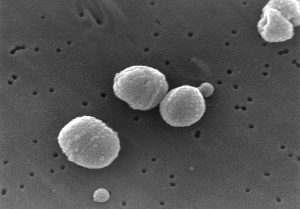
“Dexamethasone in Adults With Bacterial Meningitis”
N Engl J Med 2002; 347:1549-1556. [free full text]
—
The current standard of care in the treatment of suspected bacterial meningitis in the developed world includes the administration of dexamethasone prior to or at the time of antibiotic initiation. The initial evaluation of this practice in part stemmed from animal studies, which demonstrated that dexamethasone reduced CSF concentrations of inflammatory markers as well as neurologic sequelae after meningitis. RCTs in the pediatric literature also demonstrated clinical benefit. The best prospective trial in adults was this 2002 study by de Gans et al.
The trial enrolled adults with suspected meningitis and randomized them to either dexamethasone 10mg IV q6hrs x4 days started 15-20 minutes before the first IV antibiotics or a placebo IV with the same administration schedule. The primary outcome was the Glasgow Outcome Scale at 8 weeks (1 = death, 2 = vegetative state, 3 = unable to live independently, 4 = unable to return to school/work, 5 = able to return to school/work). Secondary outcomes included death and focal neurologic abnormalities. Subgroup analyses were performed by organism.
301 patients were randomized. At 8 weeks, 15% of dexamethasone patients compared with 25% of placebo patients had an unfavorable outcome of Glasgow Outcome Scale score 1-4 (RR 0.59, 95% CI 0.37 – 0.94, p= 0.03). Among patients with pneumococcal meningitis, 26% of dexamethasone patients compared with 52% of placebo patients had an unfavorable outcome. There was no significant difference among treatment arms within the subgroup of patients infected with meningococcal meningitis. Overall, death occurred in 7% of dexamethasone patients and 15% of placebo patients (RR 0.48, 95% CI 0.24 – 0.96, p = 0.04). In pneumococcal meningitis, 14% of dexamethasone patients died, and 34% of placebo patients died. There was no difference in rates of focal neurologic abnormalities or hearing loss in either treatment arm (including within any subgroup).
In conclusion, early adjunctive dexamethasone improves mortality in bacterial meningitis. As noted in the above subgroup analysis, this benefit appears to be driven by the efficacy within the pneumococcal meningitis subgroup. Of note, the standard initial treatment regimen in this study was amoxicillin 2gm q4hrs for 7-10 days rather than our standard ceftriaxone + vancomycin +/- ampicillin. Largely on the basis of this study alone, the IDSA guidelines for the treatment of bacterial meningitis (2004) recommend dexamethasone 0.15 mg/kg q6hrs for 2-4 days with first dose administered 10-20 min before or concomitant with initiation of antibiotics. Dexamethasone should be continued only if CSF Gram stain, CSF culture, or blood cultures are consistent with pneumococcus.
References / Further Reading:
1. IDSA guidelines for management of bacterial meningitis (2004)
2. Wiki Journal Club
3. 2 Minute Medicine
Summary by Duncan F. Moore, MD
Photo Credit: CDC/Janice Carr. Content Providers(s): CDC/Dr. Richard Facklam. Public Health Image Library #262.